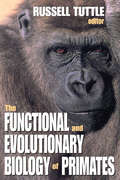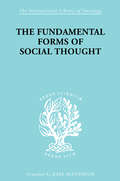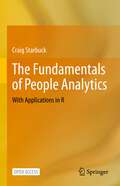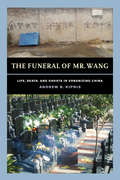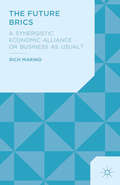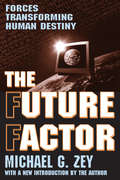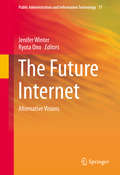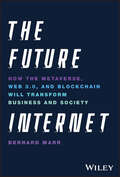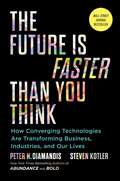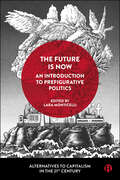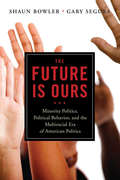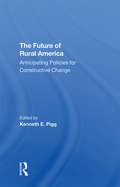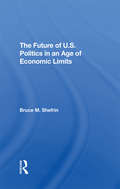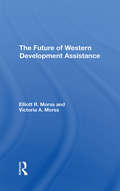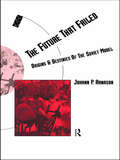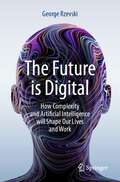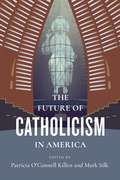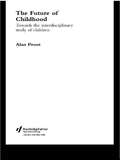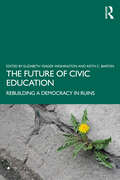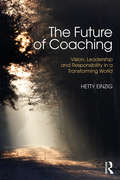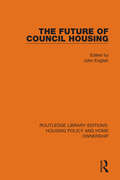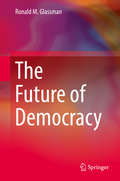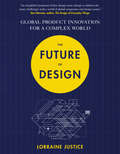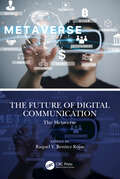- Table View
- List View
The Functional and Evolutionary Biology of Primates
by Russell TuttleThese original contributions on the evolution of primates and the techniques for studying the subject cover an enormous range of material and incorporate the work of specialists from many different fields, showing the necessity of a multidisciplinary approach to problems of primate morphology and phylogeny. Collectively, they demonstrate the concerns and methods of leading contemporary workers in this and related fields. Each contributor shows his way of attacking fundamental problems of evolutionary primatology.
The Functions of Parent-Child Argumentation
by Antonio BovaThis book provides a detailed examination of argumentative interactions in families with young children during mealtimes. It explores both the restrictions and the opportunities family mealtimes present and the types of issues addressed through argumentative discussions. Antonio Bova puts forward an in depth analysis of how both parents and children contribute to the inception and development of an argumentative discussion, and the categories of argument adopted most often by the two groups. Drawing upon a wealth of qualitative data from the recorded mealtime conversations of Italian and Swiss-Italian middle-class families, the author examines the crucial importance of argumentative interactions between parents and children during mealtimes. This book builds on recent advances in the study of the psychology of social interaction and sheds new light on the importance of argumentation at all stages of life.
The Fundamental Forms of Social Thought: An Essay in Aid of Deeper Understanding of History of Ideas (International Library of Sociology #Vol. 5)
by Werner StarkPublished in 1998, The Fundamental Forms of Social Thought is a valuable contribution to the field of Sociology and Social Policy.
The Fundamentals of People Analytics: With Applications in R
by Craig StarbuckThis open access book prepares current and aspiring analytics professionals to effectively address this need by curating key concepts spanning the entire analytics lifecycle, along with step-by-step instructions for their applications to real-world problems, using ubiquitous and freely available open-source software. This book does not assume prior knowledge of statistics, how to query databases, or how to write performant code; early chapters include an introduction to R and SQL as well as an overview of statistical foundations.Human capital is an organization’s most important asset. Without the knowledge and skills of people, an organization can accomplish nothing. The acquisition, development, and retention of critical talent has become increasingly more complex and challenging, and organizations are making significant investments to gain a deeper, data-informed understanding of organizational phenomena impacting the bottom line. By the end of this book, readers will be able to: • Design and conduct empirical research • Query and wrangle data using SQL • Profile, clean, and analyze data using R • Apply appropriate statistical and ML models to a range of people analytics use cases • Package and present analyses to communicate impactful insights to stakeholders
The Funeral of Mr. Wang: Life, Death, and Ghosts in Urbanizing China
by Andrew B. KipnisA free open access ebook is available upon publication. Learn more at www.luminosoa.org. In rural China funerals are conducted locally, on village land by village elders. But in urban areas, people have neither land for burials nor elder relatives to conduct funerals. Chinese urbanization, which has increased drastically in recent decades, involves the creation of cemeteries, state-run funeral homes, and small private funerary businesses. The Funeral of Mr. Wang examines social change in urbanizing China through the lens of funerals, the funerary industry, and practices of memorialization. It analyzes changes in family life, patterns of urban sociality, transformations in economic relations, the politics of memorialization, and the echoes of these changes in beliefs about the dead and ghosts.
The Future BRICS
by Rich MarinoThe Future BRICS provides in depth quantitative and qualitative questions and answers about the future of the BRICS Forum as a synergistic economic alliance and is a valuable resource for anyone interested in the ongoing international debate about the economic future and sustainability of the emerging markets in general.
The Future Factor: Forces Transforming Human Destiny
by Michael G. ZeyThe Future Factor offers an inspiring, optimistic view of the human future. Sociologist Michael G. Zey shows how breathtaking innovations in fields such as biotechnology, computing, robotics, medicine, energy development and space technology are catapulting global society into a new era of abundance and prosperity.As the third millennium begins, technological breakthroughs provide unprecedented opportunities for growth, profitability and organizational and personal reinvention. However, to stay ahead of the curve and anticipate future developments before competitors and peers do, leaders, companies and individuals must be equipped with the capacity to make informed decisions.In The Future Factor, Zey provides the sophisticated cutting-edge knowledge needed to achieve competitive advantage that individuals require to make career and life choices. Zey paints a big picture of new forces--biogenesis, cybergenesis, species coalescence and dominionization--that are subtly impacting society and the global economy and changing forever the way we live. Among the subjects explored in this wide-ranging book are: the role cybergenisis will play in making humans healthier; the universal communication network based on the Internet and virtual reality; biogenesis, gene therapy and decoding the human genome; "next generation" robots, smart machines and their impact on economic growth; the colonization of space and the advent of "space tourism"; fusion-based energy and its effect on the environment and global economy; global transportation and a worldwide superhighway; and biotechnological breakthroughs in agriculture and food production.
The Future Internet
by Jenifer Winter Ryota OnoReaders seeking to gain a handle on the internet's global expansion will find this book rich in scholarly foundations combined with cutting-edge discussion of emerging ICTs and services and the complex societal contexts in which they are embedded. To explore possibilities to the fullest extent, a sociotechnical systems approach is employed, focusing on the interplay of technical, social, cultural, political, and economic dynamics to explore alternative futures (ones that are not part of the dominant discourse about the internet). These shared perspectives are not well addressed elsewhere in current discussions. Awareness of these dynamics, and the fluidity of the future, is important, as humankind moves forward into the uncertain future. Due to the sociotechnical complexity of the Internet, policymakers, businesspeople, and academics worldwide have struggled to keep abreast of developments. This volume's approach is intended to stimulate dialogue between academics and practitioners on a topic that will affect most aspects of human life in the near-term future.
The Future Internet: How the Metaverse, Web 3.0, and Blockchain Will Transform Business and Society
by Bernard MarrA sneak peek at the future of the internet, from one of the web’s most prescient voices In The Future Internet: How the Metaverse, Web3, and NFTs Will Transform Business & Society, acclaimed futurist, author, and digital strategist Bernard Marr delivers a compelling and engaging discussion of the technologies driving the impending—and ongoing—transformation of the internet, including blockchain, augmented reality (AR), and more. In the book, you’ll explore the risks and opportunities presented by these game-changing techs and how they might impact you, your organisation, and community. The author explains how various sectors will be revolutionised by the future internet, as industries like sports, retail, energy, healthcare, education, and others feel the effects of paradigm-shifting developments in society and technology. He also discusses: Strategies for individuals seeking to leverage the coming changes in technology, employment, and culture The potential impact of the unprecedented combination of blockchain and AR technologies Techniques for getting in on the ground floor of a new internet that places a heavy premium on participation and immersive experiencesAn essential and incisive exploration of what our tomorrows might bring, The Future Internet is perfect for executives, managers, and other business leaders doing their best to get a head start on tomorrow’s digital economy.
The Future Is Faster Than You Think: How Converging Technologies Are Transforming Business, Industries, and Our Lives (Exponential Technology Series)
by Steven Kotler Peter H. DiamandisFrom the New York Times bestselling authors of Abundance and Bold comes a practical playbook for technological convergence in our modern era.In their book Abundance, bestselling authors and futurists Peter Diamandis and Steven Kotler tackled grand global challenges, such as poverty, hunger, and energy. Then, in Bold, they chronicled the use of exponential technologies that allowed the emergence of powerful new entrepreneurs. Now the bestselling authors are back with The Future Is Faster Than You Think, a blueprint for how our world will change in response to the next ten years of rapid technological disruption. Technology is accelerating far more quickly than anyone could have imagined. During the next decade, we will experience more upheaval and create more wealth than we have in the past hundred years. In this gripping and insightful roadmap to our near future, Diamandis and Kotler investigate how wave after wave of exponentially accelerating technologies will impact both our daily lives and society as a whole. What happens as AI, robotics, virtual reality, digital biology, and sensors crash into 3D printing, blockchain, and global gigabit networks? How will these convergences transform today&’s legacy industries? What will happen to the way we raise our kids, govern our nations, and care for our planet? Diamandis, a space-entrepreneur-turned-innovation-pioneer, and Kotler, bestselling author and peak performance expert, probe the science of technological convergence and how it will reinvent every part of our lives—transportation, retail, advertising, education, health, entertainment, food, and finance—taking humanity into uncharted territories and reimagining the world as we know it. As indispensable as it is gripping, The Future Is Faster Than You Think provides a prescient look at our impending future.
The Future Is Now: The Future Is Now (Alternatives to Capitalism in the 21st Century)
by Lara MonticelliThe gloomy prospect of climate change and ecosystems' collapse calls for an urgent rethinking of all aspects of our life: how we work, produce, eat, spend, take care of each other, relate to nature, and organize our societies. Prefigurative initiatives are attracting a growing amount of attention from scholars and activists precisely because they are envisioning alternative futures by embodying radically different ways of living in the present. Thanks to the contribution of leading researchers, 'The Future is Now' represents the go-to book for anyone seeking a comprehensive, state-of-the-art, and thought-provoking introduction to the thriving field of prefigurative politics.
The Future Is Ours: Minority Politics, Political Behavior, and the Multiracial Era of American Politics
by Gary M. Segura Dr Shaun BowlerToday's demographic reality is a "majority-minority" America wherein racial and ethnic minorities comprise a growing share of the U.S. population and electorate, and are themselves becoming more diverse and representing more decisive votes. How America evolves as a society and a polity depends on whether and how these new Americans access and are accommodated by existing institutions. The Future is Ours offers a data-based examination of whether (and exactly how) minority citizens differ from members of the white majority—in political participation, voting preferences, policy opinions, orientations toward government, and legislative representation. Data analyses are presented in non-technical fashion, but throughout the authors attempt to engage issues of research design that expose students to the logics of social science inquiry. Bowler and Segura argue that demography will, in fact, be destiny. The balance between the two parties is at a tipping point and the outcome depends on how minority Americans engage in politics.
The Future Of Rural America: Anticipating Policies For Constructive Change
by Kenneth PiggIt has been my pleasure to work with a distinguished, committed,and cooperative group of contributors to this volume. They have taught me how to perform the editing role and put up with innumerable and probably insufferable suggestions. I have been privileged to work with exceptionally fine individuals in this endeavor and will count that among my many blessings.
The Future Of U.s. Politics In An Age Of Economic Limits
by Bruce ShefrinThis study of the future of U.S. politics begins with an in-depth examination of the political, social, and economic dynamics of the present. Dr. Shefrin demonstrates that economic growth has been a key element in maintaining political stability by diverting the attention of materially deprived groups away from disruptive political activity. Examining the interaction of technological and political forces in the physical and social environment, he argues that an expectation of economic limits is reasonable—and perhaps undeniable—and focuses on the changes in the political system that can be anticipated in a no-growth or slow-growth society. Dr. Shefrin employs a nondeterministic "social choice" approach to reach the conclusion that, because the shape of the future is of major political significance, it will be the focus of intense political conflict. The four scenarios he presents reflect the major alternative directions possible for U.S. society, according to current social theory. Dr. Shefrin feels that the conflict among supporters of these alternatives will constitute the politics of the future.
The Future Of Western Development Assistance
by Elliott R Morss Victoria A MorssSince the inception of Western development assistance, significant changes in the makeup of donors, recipients, development goals, and strategies have taken place. However, major donor institutions have not yet weighed the impact of these changes on their operations and objectives in anticipation of the future global environment. Discussing trends that will profoundly affect development assistance strategy, the authors raise such questions as: Will the demand for Western technical assistance drop sharply over the next decade? Was the Latin American debt crisis precipitated by the loan practices of international commercial banks? Should aid to Africa be shifted from investment in rural desert areas to investment in urban planning and infrastructure? Also examined are such concerns as the outside management of agricultural research; the U.S. focus on purchasing political allegiance with its aid programs, thus creating dependent nations; the threat to East Asian economic growth posed by the micro-electronics revolution; and the growing conflict between western aid and trade objectives. The authors' purpose is not to provide definitive prescriptions for future development programs, but rather to focus the attention of policymakers on important, but often neglected, issues.
The Future That Failed: Origins and Destinies of the Soviet Model (Social Futures)
by Johann P. ArnasonThis outstanding book deals with the Soviet model as a distinctive pattern of modernity. Its historical background and its institutional structure are thoroughly examined as are its implications for understanding Modernity. The book challenges many of the simple assumptions and judgements made about the Soviet road. It is essential reading for students of Political Science, Sociology and Soviet History
The Future is Digital: How Complexity and Artificial Intelligence will Shape Our Lives and Work
by George RzevskiThis book describes in an easily accessible way how artificial intelligence (AI) will help us to overcome the ongoing rise in complexity and thus shape our lives and work in a not-too-distant future. AI has proven to be the latest tool for resolving issues created by the most recent surge in complexity, and the corollary is: those who delay or ignore AI, will be overwhelmed by complexity. The book starts with a broad description of the coevolution of technology and society that irreversibly leads to the sharp increase in complexity of our socioeconomic environment. The second chapter then covers concepts and principles of the new science of complexity which helps us to understand issues caused by socioeconomic complexity and provides methods for resolving them. Subsequently, a beginner’s guide to artificial intelligence helps readers to glance at fundamentals of this powerful technology capable of resolving issues created by socioeconomic complexity. The danger of allowing intelligent digital systems to make high-risk decisions as well as the consequences of possible misuse of AI for fraud and fake are also discussed. The following chapter explores the concepts of natural and digital ecosystems. Digital transformation of rigidly structured corporations and administrations into adaptive and evolving organisations are illustrated by a number of case studies. Next, the current hectic transition of industrial to digital society is described, its origins identified and outcomes predicted, highlighting issues created by the increase in complexity and showing how to resolve them using thinking tools such as a complexity mindset and digital tools such as artificial intelligence. Eventually, the last two chapters outline the author’s vision of the future digital economy and digital society. This book is accessible to everyone who is curious to glimpse into the future, no previous special knowledge of digital technology is required. Especially decision makers in politics, business, administration, banking, policy making, education, healthcare and defence, and their advisors will benefit from the book, as it will help them to contribute to the creation of the brave new digital world. It may also support investors to recognise which elements of digital technology will play the most important role in the near future.
The Future of Catholicism in America (The Future of Religion in America)
by Mark Silk Killen Patricia O’ConnellCatholics constitute the largest religious community in the United States. Yet most American Catholics have never known a time when their church was not embroiled in controversies over liturgy, religious authority, cultural change, and gender and sexuality. Today, these arguments are taking place against the backdrop of Pope Francis’s progressive agenda and the resurgence of the clergy sexual abuse crisis. What is the future of Catholicism in America?This volume considers the prospects at a pivotal moment. Contributors—scholars from sociology, theology, religious studies, and history—look at the church’s evolving institutional structure, its increasing ethnic diversity, and its changing public presence. They explore the tensions among members of the hierarchy, between clergy and laity, and along lines of ethnicity, immigration status, class, generation, political affiliation, and degree of religious commitment. They conclude that American Catholicism’s future will be pluriform—reflecting the variety of cultural, political, ideological, and spiritual points of view that typify the multicultural, democratic society of which Catholics constitute so large a part.
The Future of Childhood
by Alan ProutIn this ground-breaking book, Alan Prout discusses the place of children and childhood in modern society. He critically examines 'the new social studies of childhood', reconsidering some of its key assumptions and positions and arguing that childhood is heterogeneous and complex. The study of childhood requires a broad set of intellectual resources and an interdisciplinary approach. Chapters include: the changing social and cultural character of contemporary childhood and the weakening boundary between adulthood and childhood a look back at the emergence of childhood studies in the nineteenth and twentieth centuries the nature/culture dichotomy the role of material artefacts and technologies in the construction of contemporary childhood. This book is essential reading for students and academics in the field of childhood studies, sociology and education.
The Future of Civic Education: Rebuilding a Democracy in Ruins
by Keith C. Barton Elizabeth Yeager WashingtonSpeaking to the need to move beyond traditional formulations, this textbook presents radical visions for transforming civic education in the United States.Drawing on the experience of educators and scholars—including those rooted in feminist, queer, abolitionist, global, and race-conscious perspectives—this work offers new, practical ideas for civic education reform. Responding to recent political crises, many scholars, educators, and public commentators have called for a rebirth of civic education, but these all are grounded in the premise that the goal of civic education should be to teach students about the U.S. Constitutional system and how to operate within it. This book argues that the U.S. governmental system, including the Constitution, is infused with racist and anti-democratic premises and procedures. It asks: How can we seek a new path—one that is more democratic, more equitable, and more humane? A diverse range of leading civic educators, who are willing not just to push the boundaries of civic education but to operate outside its assumptions altogether, explore what future possibilities for civic education might look like and how these innovative ideas could be implemented in the classroom.Combining theory with practice, The Future of Civic Education will be important reading for those studying or researching in social studies methods, social studies issues, citizenship, and civic education. It will also be beneficial to social studies teachers at elementary and secondary levels, as well as policymakers and non-governmental organizations (NGOs).
The Future of Coaching: Vision, Leadership and Responsibility in a Transforming World
by Hetty EinzigWe live in a world that is volatile, uncertain, complex and ambiguous, in which our work and lives are constantly disrupted and changing. But coaches and leaders are still trained to operate within stable models with a uni-focus on performance. Coaches are starting to question the remit of ‘raising performance’ within existing systems, many of which are outdated, dysfunctional and even toxic. The role of the coach today must evolve to become fit for purpose in challenging times and coaching must re-articulate its values, as the essential compass for navigating turbulent waters. In The Future of Coaching, Hetty Einzig examines the role of coaching and leadership in the twenty-first century, and sets out a compelling vision for its future. Drawing on experience gained over twenty-five years of coaching leaders in the corporate and public sectors, in the UK and globally, she challenges the tenet of coaching neutrality. Rather than simply following the client agenda, she encourages coaches to see themselves as partners in courageous leadership and to work towards building an ethical, holistic and networked coaching approach to help create businesses that serve society and our globalised world. The book asks essential questions of coaches working today: how can leaders and coaches become ‘positive deviants’ and transform the rules of the game within cultures where denial and group-think are rife? How can coaches work with the anxious and depressed, embracing the dark as well as the light? Are coaches prepared for the rise of Millennials, women leaders and those over sixty (the Third Acters)? Einzig challenges the model of the Strong Leader in favour of Respons-able leadership based on authentic strength, distributed power and responsive thinking. And she shows how this vision of a transformed workplace is essential for the transformations society must undertake to reclaim a positive future. This thought provoking collection of essays, designed to be read in any order, is enlightening and inspiring reading for coaches in practice and in training, HR and L&D professionals and for leaders everywhere.
The Future of Council Housing
by John EnglishOriginally published in 1982, at a time when the UK government was pursuing the policy of council house sales, this book explores the implications of selling council houses, criticises the housing management and policies of the 1970s and 80s and argues forcefully for the retention of the council housing sector.
The Future of Democracy
by Ronald M. GlassmanThis book focuses on the processes that help stabilize democracy. It provides a socio-historical analysis of the future prospects of democracy.The link between advanced capitalism and democracy is emphasized, focusing on contract law and the separation of the economy from the state. The book also emphasizes the positive effects of the scientific world view on legal- rational authority. Aristotle’s theory of the majority middle class and its stabilizing effect on democracy is highlighted.This book describes the face to face democracies of the past in order to give us a better perspective on the high tech democracies of the future, making it appealing to students and academics in the political and social sciences.
The Future of Design: Global Product Innovation for a Complex World
by Lorraine JusticeHow can today's designers better engage with new and emerging technologies to take advantage of the opportunities these technologies can bring?"An insightful treatment of how design must change to address the many challenges with a world of global companies and design teams."--Don Norman, author, The Design of Everyday Things WHAT ARE THE 10 GLOBAL FACTORS THAT DETERMINE DESIGN SUCCESS?Using a wealth of examples from across multiple industries and countries, design expert Lorraine Justice fully explores the factors that will determine your success and provides a unique framework for navigating the industry into the future.You will learn how design and innovation are being impacted by new and emerging technologies, societal demands, cultural shifts, and broader world issues. The Future of Design is practical, concise and includes guidelines for building and supporting creative teams, advice and strategies for evaluating product concepts, and interviews with product designers, inventors, and innovators from around the world.
The Future of Digital Communication: The Metaverse
by Raquel V. Benítez RojasThis collection of essays explores the present and future of digital communication through a range of interdisciplinary approaches, all of which focus on the so-called metaverse. The metaverse is a combination of multiple elements of technology – including virtual reality, augmented reality, and video – where users "live" within a digital universe. The vision for this new universe is that its users can work, play, and stay connected with friends through everything. Such a vision is hinted at in existing phenomena such as online game universes.
